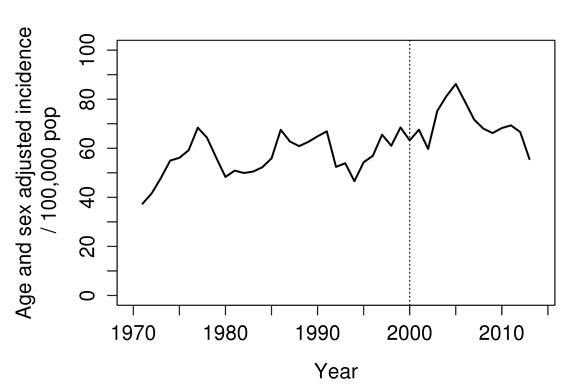Session Information
Date: Wednesday, November 16, 2016
Title: Epidemiology and Public Health III: Psoriatic Arthritis and More
Session Type: ACR Concurrent Abstract Session
Session Time: 11:00AM-12:30PM
Background/Purpose: To determine time trends in the incidence and survival analysis of polymyalgia rheumatica (PMR) over a 15 year period in a geographically defined population and to descriptively compare the incidence of PMR in this time period to a previous incidence cohort from the same population base.
Methods: In a geographically defined population, we retrospectively identified all incident cases of PMR between January 1, 2000, and December 31, 2014. Detailed review of all individual medical records was performed. All but 4 of these cases (who were age<50 years) fulfilled EULAR/ACR classification criteria for PMR. Incidence rates were age and sex adjusted to the US white 2010 population and were graphically illustrated using 3 year centered moving averages. Survival rates were computed using Kaplan-Meier methods and were compared with the expected rates in the population of the US State.
Results: There were 407 incident cases of PMR during the 15 year study period. Of these 64% were female and the mean age at incidence was 73.9 years. The overall age and sex adjusted annual incidence of PMR was 68.3 (95% confidence interval [CI] 61.6, 75) per 100,000 population aged ≥50 years. Incidence rates increased with age in both sexes, but incidence fell after age 80 years among women. The incidence rates fluctuated over the period of observation (Figure) with evenly spaced peaks in 1970, 1990 and 2005. Comparing the two time periods, there was a significant increase in incidence of PMR in the recent time period compared to 1970-1999 (age and sex adjusted rate: 55.8 per 100,000; p=0.011). During median follow-up of 6.4 years, 120 patients died. Mortality among individuals with PMR was not significantly worse than that expected in the general population (standardized mortality ratio: 0.73; 95% CI: 0.60, 0.87).
Conclusion: The incidence of PMR has increased slightly in the past 15 years compared to previous decades. Survival among patients with PMR is not worse than the general population. Further research is needed to understand the determinants of the increase in incidence of PMR.
To cite this abstract in AMA style:
Raheel S, Crowson CS, Matteson EL. Epidemiology of Polymyalgia Rheumatica 2000-2014: A Population Based Study [abstract]. Arthritis Rheumatol. 2016; 68 (suppl 10). https://acrabstracts.org/abstract/epidemiology-of-polymyalgia-rheumatica-2000-2014-a-population-based-study/. Accessed .« Back to 2016 ACR/ARHP Annual Meeting
ACR Meeting Abstracts - https://acrabstracts.org/abstract/epidemiology-of-polymyalgia-rheumatica-2000-2014-a-population-based-study/

